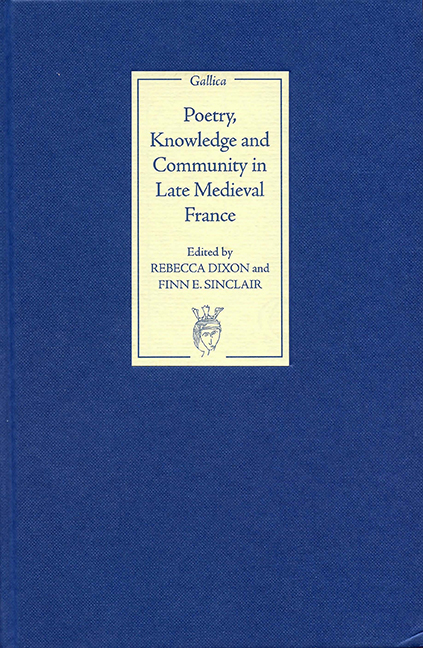Book contents
- Frontmatter
- Contents
- List of Illustrations
- List of Contributors
- Preface
- Introduction: L'Amour de Sophie. Poésie et savoir du Roman de la 1 Rose à Christine de Pizan
- PART I LEARNED POETRY/POETRY AND LEARNING
- 1 Poetry and the Translation of Knowledge in Jean de Meun
- 2 Apprendre à jouer? Fonctions de la partie d'échecs des Eschés amoureux
- 3 Jean Gerson, Poet
- 4 Gerson and Christine, Poets
- Part II Poetry or Prose?
- Part III Poetic Communities
- Conclusion: Knowing Poetry, Knowing Communities
- Bibliography
- Index
- Miscellaneous Endmatter
4 - Gerson and Christine, Poets
from PART I - LEARNED POETRY/POETRY AND LEARNING
Published online by Cambridge University Press: 25 October 2017
- Frontmatter
- Contents
- List of Illustrations
- List of Contributors
- Preface
- Introduction: L'Amour de Sophie. Poésie et savoir du Roman de la 1 Rose à Christine de Pizan
- PART I LEARNED POETRY/POETRY AND LEARNING
- 1 Poetry and the Translation of Knowledge in Jean de Meun
- 2 Apprendre à jouer? Fonctions de la partie d'échecs des Eschés amoureux
- 3 Jean Gerson, Poet
- 4 Gerson and Christine, Poets
- Part II Poetry or Prose?
- Part III Poetic Communities
- Conclusion: Knowing Poetry, Knowing Communities
- Bibliography
- Index
- Miscellaneous Endmatter
Summary
A Dieu s'en va et a mort amere
Jhesus veyant sa doulce mere.
Si devons bien par penitence
De ce deuil avoir remembrance. (St Jean 13:3)
[To God and to a bitter death goes Jesus, seeing his sweet mother. Thus we must through penitence have remembrance of this sorrow.]
My chapter takes up where Mishtooni Bose's leaves off, with a consideration of Jean Gerson's vernacular poetry. You have an example inscribed above in a quatrain of Gerson's own invention, with which he opens his sevenhour- long 1403 Good Friday sermon. Although the bulk of Gerson's corpus is in Latin, he did write two volumes’ worth of tracts, sermons, and poems in French, forming a hefty corpus had he written nothing else. The texts of Gerson's contemporary Christine de Pizan are exclusively in the vernacular. Although not as prolific a writer as Gerson, Christine's productions nonetheless constitute a weighty stack, numbering some forty texts in a variety of genres – lyric poetry, biography, mirrors for princes and princesses, and more topical political tracts. Although Gerson's Latin works far outnumber his French ones, the fact that he would use a quatrain he had composed himself to structure and animate arguably the most popular of his many sermons is a trustworthy indicator of his high regard for the potential uses of vernacular poetry.
In this chapter I develop further the notion, as explained by Bose, that Gerson distinguishes carmen from poema, suggesting that the former can be equated with the song of an elevated and culturally sanctioned kind (the Psalms being the model), whereas the latter is the more general term for fictive discourse, and is less positively regarded. I argue that both Gerson and Christine attempt to raise their vernacular poetry to the level that Gerson prescribes for Latin carmina. Specifically, I relate Christine's poems which have the Psalms as model to those composed by Gerson. I claim as well that Gerson's French poetry played a central role in realizing two of his lifelong aims: healing divisions within France, and promoting the country, with himself as its chief mouthpiece, as the spokesperson for a united Christianity.
- Type
- Chapter
- Information
- Poetry, Knowledge and Community in Late Medieval France , pp. 69 - 82Publisher: Boydell & BrewerPrint publication year: 2008

